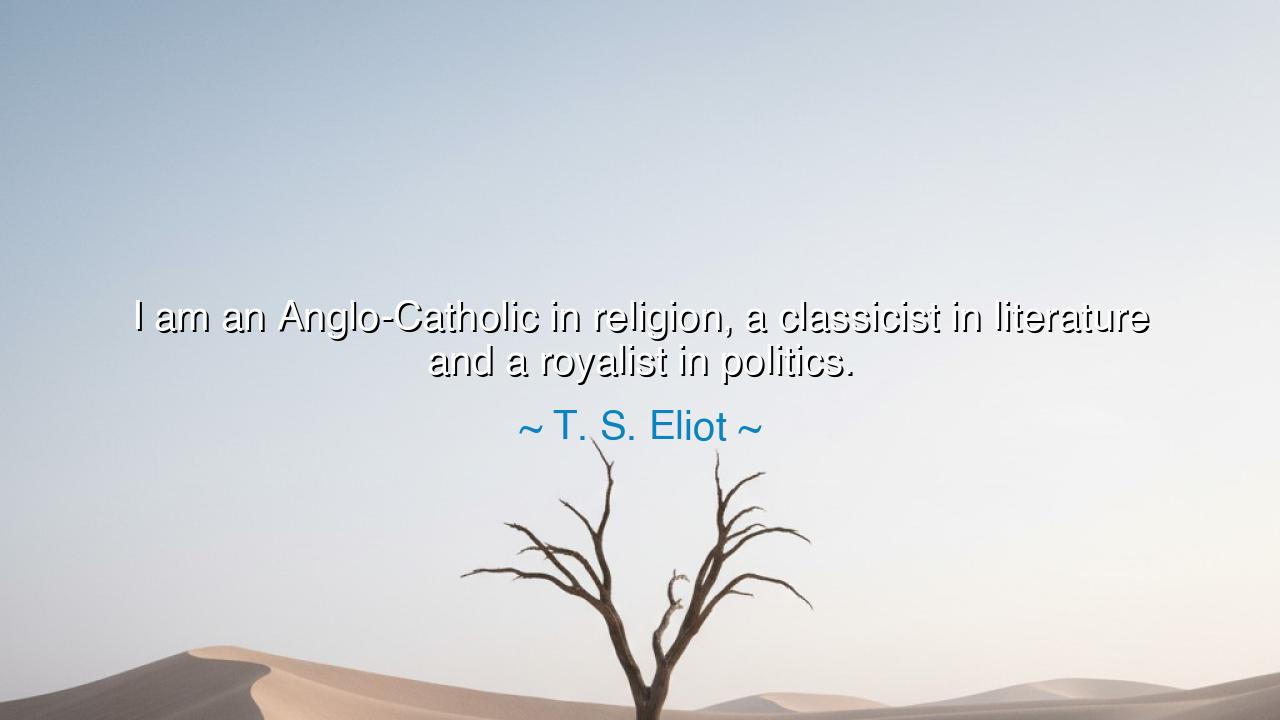
I am an Anglo-Catholic in religion, a classicist in literature
I am an Anglo-Catholic in religion, a classicist in literature and a royalist in politics.






“I am an Anglo-Catholic in religion, a classicist in literature, and a royalist in politics.” — so declared T. S. Eliot, the poet of modern disillusionment and spiritual renewal. In this confession, spoken with the weight of conviction, Eliot revealed not merely his personal allegiances, but his entire philosophy of order, faith, and meaning in a broken age. These words were written in the aftermath of the First World War, when the modern world had been shaken to its foundations — when the old beliefs had crumbled, and mankind, in its pride, sought to build new towers upon the sands of doubt. Eliot, standing amid the ruins, turned not to rebellion, but to restoration. He sought in religion, in art, and in governance the eternal structures that had once anchored the soul of civilization.
When Eliot called himself an Anglo-Catholic, he spoke as one who had crossed the desert of skepticism and found water in the well of ancient faith. The modern man, he saw, was adrift — severed from mystery, from worship, from the sacred rhythms that give life meaning. To him, Anglo-Catholicism represented the union of intellect and devotion, of reason and ritual, where truth was not invented by man but revealed by God. In its liturgy and tradition, he found continuity with the past, a living thread stretching from the apostles through the centuries. For Eliot, faith was not a refuge for the weak, but the discipline of the strong — a binding force that kept the human spirit from dissolving into chaos.
As a classicist in literature, Eliot turned his eyes to the Greeks and Romans, to the poets and philosophers who sought harmony between form and spirit. He rejected the formlessness of the modern age — the art that shouted without meaning, the poetry that despaired without purpose. In the ancients, he found the principle of order, the belief that beauty arises from restraint, and that the artist’s duty is not to mirror chaos, but to bring clarity to it. He admired the classical balance between emotion and reason, the dignity of structure, the reverence for the eternal truths that transcend any single age. Thus, even as he wrote of the wasteland of modernity, he did so with the architecture of the ancients — seeking, through fragments, to rebuild the temple of meaning.
And when Eliot declared himself a royalist in politics, he was not merely pledging loyalty to kings, but to the idea of hierarchy, tradition, and continuity. He saw in monarchy a symbol of moral order — not a tyranny of power, but a recognition of the sacred chain that binds ruler and subject, past and future, heaven and earth. In an age intoxicated with revolution, Eliot stood apart, warning that freedom without reverence leads not to enlightenment, but to dissolution. The royalist, in his eyes, was not one who worships crowns, but one who honors the idea that society must serve something greater than itself.
Consider the Europe of Eliot’s youth — shattered by war, drowning in cynicism. Faith had been mocked, art had been unmoored, and politics had descended into rage and ideology. In the faces of this new world, Eliot saw not progress, but loss — the loss of the sacred, the loss of continuity, the loss of form. Like a priest among ruins, he sought to rebuild the altar stone by stone: through faith that sanctifies, through art that endures, through order that restrains the wildness of man. His declaration was not nostalgia, but resistance — a vow to stand upon what is eternal when all else trembles.
There is an ancient wisdom in Eliot’s triad: faith, beauty, and order. He teaches that a civilization without faith becomes soulless; that art without discipline becomes noise; that politics without reverence becomes chaos. Each element sustains the others — religion nourishes virtue, literature refines the spirit, and just governance protects both. Together they form the harmony of a healthy culture, where truth is not buried beneath novelty, but shines like the morning star upon all things.
So, what lesson does Eliot’s declaration offer us now, in an age no less uncertain than his own? It is this: do not despise the foundations of the world. Seek stability not in the noise of the moment, but in the deep waters of tradition. Anchor your soul in faith that endures, cultivate your mind with art that uplifts, and serve your community with honor and humility. For though times may change, the human heart still yearns for order, for beauty, for belonging. And when all else fades, these three — faith, form, and fidelity — will remain as the pillars upon which civilization, and the soul itself, can stand unshaken.
Thus, Eliot’s words are not merely a self-description, but a map for the weary soul of modern man. To believe as an Anglo-Catholic, to write as a classicist, to live as a royalist — these are not labels, but postures of reverence before truth. In them lies the wisdom of the ancients, the strength of the saints, and the serenity of one who has found his place amid the turmoil of time. Let each of us, then, seek our own trinity of devotion — to the sacred, to the beautiful, and to the good — that we, too, may live in harmony with eternity.






AAdministratorAdministrator
Welcome, honored guests. Please leave a comment, we will respond soon